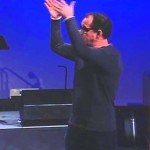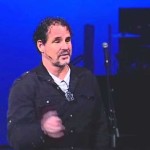We run our website the way we wished the whole internet worked: we provide high quality original content with no ads. We are funded solely by your direct support. Please consider supporting this project.

A Brief Theology of Sin
We were created for unbroken, loving fellowship with God. We see this in the creation story. As we share in this unbroken, trusting fellowship with God, we participate in the very love that the Father, Son, and Holy Spirit share throughout eternity. We also read in the creation story that sin ruptured this fellowship and sidetracked God’s plan. The origin and essence of sin is rooted in how we understand the Tree of the Knowledge of Good and Evil.
The first thing we need to notice about the Tree of the Knowledge of Good and Evil is that it was located in the middle or the center of the garden, along with the Tree of life. Here God provided a provision and a prohibition. The Tree of Life was God’s provision to meet our needs and share his life endlessly. The Tree of the Knowledge of Good and Evil was God’s prohibition against humans overstepping their proper domain.
God provided a “No Trespassing” sign to protect us from overstepping our finitude. At the center of the beautiful existence God wills for us is the humble recognition that we are not God and thus must leave to God what God wills to keep for himself, namely, the knowledge of good and evil.
As the Creator, God alone has the right and the ability to define good and evil. When God administers judgment, knowing good and evil, it serves God’s purpose of inviting agents into his love. When humans try to do this, however, it tends to facilitate death for ourselves and others.
Our fundamental sin is that we place ourselves in the position of God and divide the world between what we judge to be good and what we judge to be evil. And this judgment is the primary thing that keeps us from the doing the central thing God created and saved us to do, namely love like he loves.
God alone knows each human heart. God alone knows what each person was originally given to work with in terms of his or her psychological, physical, and even spiritual aptitudes. God alone knows the myriad factors that influence each decision people make. And God alone knows the extent to which people choose what they do out of their own free will and the extent to which their choices are the result of factors outside themselves. Unless we are intimately involved in a person’s life, this information is completely hidden from us. Hence, while there are intimate contexts in which we are to hold each other accountable, Scripture uniformly testifies that God alone is able to judge and warns us not to judge. (See Matt 7:1-5.)
The essence of sin according to the Genesis account is the transgression of this proper boundary. We are not satisfied with being God-like in our capacity to love; we also want to become God-like in our capacity to judge, which is how the serpent tempts us. But in aspiring toward the latter, we lose our capacity for the former, for unlike God, we cannot judge and love at the same time.
The essence of sin is that we play God. We critically assess and evaluate everything and everyone from our limited, finite, biased perspective. Instead of simply receiving life from the Tree of Life, we try to derive our likeness of God, our life and worth, from that which is forbidden at the center or our existence, the knowledge of good and evil.
—Adapted from Repenting of Religion, pages 67-68
Photo credit: Shaikhji via VisualHunt.com / CC BY-ND
Related Reading

Sermon Clip: Brain Reign
In this short clip, Greg Boyd discusses the 3 parts to who we are to help understand the brains role. What does role does the mind, body, and spirit play in who we are? In the full sermon we look at the New Testament teaching on reigning over the relational brain. Understanding how God wired…

Sermon Clip: The Cross and the Tree
In this short sermon clip, Greg Boyd discusses how Christians should react to the world with love. In the Garden of Eden, Adam and Eve were tempted to eat from the Tree of the Knowledge of Good and Evil. They did this because they didn’t understand that God was protecting them. In this sermon, Greg…

A Lesson in Otherness
http://youtu.be/VeK759FF84s Long, long ago, a third grade teacher taught her class a lesson they will never forget. You won’t forget it either. This video is nearly 15 minutes long, but it’s so worth your time. Let’s love one another.

What Jesus Revealed About Being Human
According to the creation story, when Adam and Eve ate the fruit, they essentially ceased being the wonderful, God-centered, God-dependent human beings the Creator intended them to be. They became less than fully human. Instead, they began using everything and everyone in the world as surrogate gods, trying to get from people, deeds, and things…

Sermon Clip: The Worst of Sinners
In this short clip, Greg Boyd discusses Paul’s definition of love. In the full sermon, Greg talks about how in this dog eat dog world, we’re programmed to judge others. But to love others with unsurpassable worth, we must ascribe worth to them at cost to ourselves. In this sermon, Greg talks about how to…
